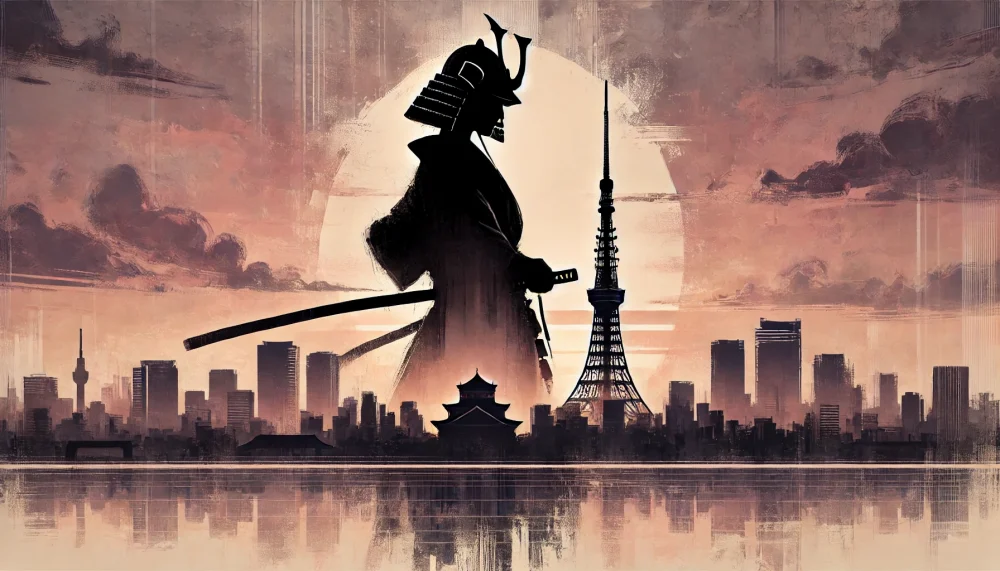
February 25, 2025
The Samurai’s Legacy in Japanese Corporate Culture
The power of harmony and collaboration
If you ever attend a business meeting in a Japanese corporate office, you might notice the strict etiquette around seating. It’s almost guaranteed that the highest-ranking person will sit at the far end of the table, away from the door, and the lowest-ranking person will sit closest to it. Known as sekiji, this seating protocol isn’t just about respect—it’s rooted in a defense tactic from the Edo period when samurai roamed Japan and assassins posed real threats. By seating superiors farthest from the door, they’d have a better chance to prepare if an intruder entered, while those closest would absorb the initial risk.
This seating protocol is one of many echoes from Japan’s feudal past that subtly shape Japanese corporate culture today. Centuries-old customs and traces of samurai tradition remain ingrained in ways that may not always be easy to spot, but still deeply influence how Japan’s corporate culture operates.
The Way of the Warrior in Japanese Corporate Culture
When picturing samurai, dramatic sword fights and fierce battles come to mind. We tend to think of a warrior serving a Japanese feudal lord, and, of course, about extreme acts like seppuku, the ritual suicide performed in the case of dishonor. But lately, I’ve been thinking more about the morals of a samurai—about Bushido, the “way of the warrior”. Bushido guided the samurai’s life and conduct, particularly in duty, honor and loyalty. Originating during the Edo period (1603–1868), the philosophy emphasized serving one’s lord with absolute faithfulness and valuing honor above all else.
This warrior ethos still resonates in corporate Japan. No, white-collar workers don’t commit suicide by disembowelment if they dishonor their boss, but devotion, seniority and respect are visible across corporate ranks. Professor Frederik Cryns, an expert in Japanese history at the International Research Center for Japanese Studies in Kyoto, who, might I add, was also the historical adviser on this year’s big hit TV series “Shogun” (2024), says the samurai’s influence is especially clear in the emphasis on loyalty and hierarchy in traditional Japanese corporations.
You might also be interested in reading: The True Story Behind the Hit Series Shogun: William Adams.
Loyalty is Key in Japanese Corporate Culture Today
Though the practice is declining, many Japanese companies still maintain structures where employees feel cared for in exchange for lifetime employment, mirroring the lord-retainer relationship of samurai times. Professor Cryns notes that hierarchical structures from the Edo period continue in traditions like the senpai-kohai relationship, where senior employees mentor the junior. This hierarchy, he explains, reflects samurai customs where seniority held paramount importance.
For example, Toyota employs a mentorship system in this way, and the culture not only strengthens team dynamics but also drives innovation and efficiency within the company, showcasing how samurai principles can contribute to business success.
When employees in companies meet for the first time, they will begin a careful exchange of business cards—meishi koukan. There is a specific etiquette for how it should be done to show respect for the person, thus reflecting the samurai’s status protocol. Present it with both hands, ensuring it faces the recipient. Accept a card with both hands, take a moment to examine it, and store it in a business card holder, treating it with care to show respect for the person it belongs to.
While for some people, these practices are commonly known to stem from Edo times, certain practices are less obviously tied to samurai origins. For example, the practice of kaizen, continuous improvement, connects to Bushido’s focus on self-cultivation.
One of the most recognizable aspects of Japanese corporate culture is the nomikai tradition. This is where colleagues socialize over drinks after work. Similar to how samurai shared sake after battles, modern employees unwind after a long, sometimes stressful day at the office. This act of sharing sake symbolized trust and strengthened relationships, building social capital. It is as vital in today’s corporate world as it was on the battlefield.
The Dark Side of Samurai-Influenced Loyalty
While seppuku is an outdated practice, suicide in Japanese corporate culture, unfortunately, is still present. These tragedies don’t usually result from dishonor towards one’s superior, but a sense of loyalty can play a role. In 2022, suicides attributed to “problems at work” rose for the first time in a decade. This is a significant increase from 1,935 cases in 2021 to 2,968 cases in 2022. In fact, it is the highest on record, according to the Ministry of Health, Labor and Welfare.
The phenomena of karoshi (death by overwork) and karojisatsu (suicide by overwork) often stem from employees’ deep sense of loyalty and responsibility. The genuine wish to not let down one’s boss, coworkers or company can push people to extreme working hours. Professor Cryns explains that during the Edo period, samurai eventually became a bureaucratic class, performing administrative duties within castle walls. The jobs of present white-collar workers have much in common with the samurai duties at the time. Both groups working long hours to demonstrate faithfulness to their superiors and their team.
The Warrior Wears a Suit and Tie
Japanese corporate culture is gradually evolving. Yet samurai values of loyalty, respect and dedication to improvement continue to echo in corporate offices. While practices like lifetime employment and strict hierarchies are slowly fading, largely due to a new generation prioritizing mental health and work-life balance, the deeply rooted traditions remain visible. Professor Cryns observes that many companies now incorporate Western management practices, yet core samurai ideals persist, shaping Japan’s workplace dynamics.
Some progressive companies are successfully blending these traditional values with modern approaches. They are embracing flexible hours, mental health support and flatter hierarchies. Through such adaptations, these firms illustrate how Japan’s cultural heritage can inform and strengthen a balanced, sustainable work environment for future generations.
Though samurai traditions may no longer dominate the office, they are unlikely to disappear entirely. The encouragement of knowledge sharing and collaboration enhances overall productivity. The samurai’s focus on continuous self-improvement aligns with the principle of today’s kaizen. In turn, this motivates employees to develop their skills for the collective good. By integrating these ideals, companies create a supportive workplace culture that drives innovation and success. In today’s corporate Japan, the warrior spirit isn’t gone—it’s just wearing a suit.
If you enjoyed this article on Japanese corporate culture, you might also be interested in: “They Ripped Up My Resignation Letter”: 1 in 5 Japanese Workers in Their 20s Turn to Resignation Agencies.







